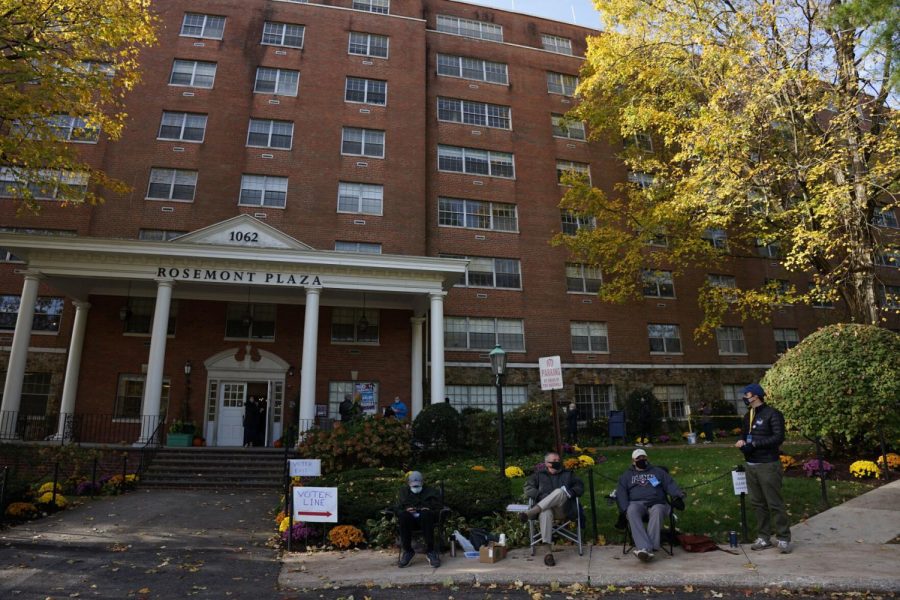Pennsylvania’s Importance in the 2020 Election
Voters wait outside of Rosemont Plaza.
November 3, 2020
Pennsylvania, the state the University calls home, is one of the most important, if not the most important, swing states of the 2020 presidential election. In 2016, It was key in electing President Donald Trump. With 20 electoral college votes, Pennsylvania will definitely prove to be beneficial for whichever candidate is able to swing the state. As of Thursday, Oct. 29, Pennsylvania was almost evenly divided in the polls, with Democratic candidate former Vice President Joe Biden up 51 percent against Trump’s 43 percent. Although Biden is up in the polls, the lead is not comfortable enough for either party to be able to predict which way Pennsylvania will vote come Nov. 3. The election of 2016 broke Pennsylvania’s streak of voting blue, which it had done in the previous six presidential elections.
Pennsylvania has the potential to decide the results of the election as one of the three most important battleground states this election. Along with Wisconsin and Michigan, both presidential candidates are doing their best to pull each state. According to FiveThirtyEight.com, whoever wins the state of Pennsylvania will almost definitely win the election. Trump would have an 84 percent chance of winning the election if he is able to keep Pennsylvania red, while Biden has a 96 percent chance of clinching the election if he turns his home state blue.
Many University students, such as Kylie Horan, wanted to vote in Pennsylvania this election so their vote would count more in terms of the electoral college. Horan is a Long Island, N.Y. native.
“Pennsylvania is a swing state and since New York is almost entirely blue, I wanted to vote somewhere where my vote has the potential to count more,” she said.
Pennsylvania voters are feeling the pressure this election, especially because of how close the margin was between Trump and Hillary Clinton back in 2016. Trump won the state by less than 1 percent of the total number of ballots. Horan believes Joe Biden has a better chance of winning Pennsylvania than Clinton did.
“I think Biden has a better chance than Clinton because Pennsylvania is his home state, so natives are more likely to vote for him out of Pennsylvanian pride,” she said. “He has also made a better effort to appeal to the middle class in states like Pennsylvania than Hillary Clinton did.”
Neither party is secure with how it stands in the state of Pennsylvania, and not even the polls can predict the correct outcome. The final polls of the 2016 election had Clinton winning the state by 2.1 percent. However, come Election Day, she lost the state by a slim margin of 0.7 percent. The polls can be wrong, so voters are trying not to rely too heavily on them this election.
Voters will not be able to gauge the true results of the election in Pennsylvania until Election Day, or at least until all votes are counted.
“After the last presidential election, I have grown weary of the polls,” University student Zachary Toles said. “Due to the electoral college, polls should not be taken too seriously because the popular vote can be overridden.”
In 2016, Clinton received 89.8 percent of Pennsylvania’s Black vote, which, although high, was a decrease from Barack Obama’s 96 percent in 2012. Even though it was just a few percentage points, if she had Obama’s Black vote percentage, she may have narrowly won the state. As a result of the Black vote in Pennsylvania being so important, both candidates are hoping to get their numbers up among the Black voting community. Toles is a Black voter in Pennsylvania and has already cast his vote, but he does not feel that his voice is being heard.
“The Black vote is simply appearing to be a popularity contest,” he said. “We are being told what we want to hear but they appear to be empty promises.”
Many voters deal with thoughts that their votes are not necessarily important, especially when they live in a state that is not a battleground state. However, Pennsylvania is proof that every vote counts.


